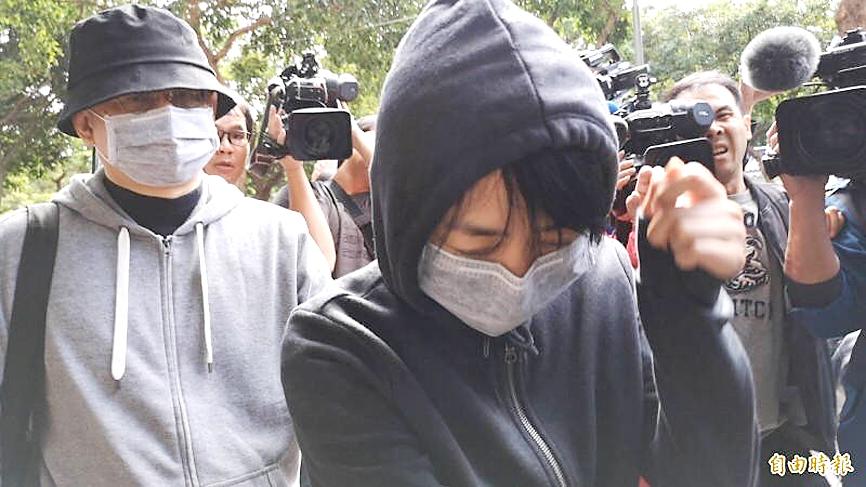The Taipei District Prosecutors’ Office yesterday charged Xiang Xin (向心), a suspected Chinese intelligence officer, and his wife, Kung Ching (龔青), with money laundering and breaches of the National Security Act (國家安全法) in a case related to self-professed Chinese spy William Wang Liqiang (王立強).
Mainland Affairs Council (MAC) spokesman Chiu Chui-cheng (邱垂正) said that the council respects the judiciary, declining to comment on an individual case.
The Chinese government has been using Taiwan’s democracy and freedoms to infiltrate society, Chiu said, adding that the government must tighten laws when necessary.

Photo: Chien Li-chung, Taipei Times
It is the first formal indictment of Xiang and Kung, who were stopped at Taiwan Taoyuan International Airport on Nov. 24, 2019, when attempting to flee on an outbound flight, one day after Australian media aired interviews with Wang.
Wang told reporters that he had conducted espionage in Taiwan, saying that Xiang was China’s spy directing espionage activities, intelligence gathering and covert operations in Taiwan and Hong Kong.
The couple had registered China Innovation Investment Ltd (中國創新投資) in Taipei, with Xiang as executive director and Kung as acting director, prosecutors said, adding that they invested in real estate, purchasing three luxury condominium units in Taipei’s Xinyi District (信義).
Over the past decade, the couple had illegally transferred about NT$740 million (US$26.03 million at the current exchange rate), mainly from the Shanghai-based Guotai Investment Holding Group (國太投資), prosecutors said.
In 2018, a Shanghai court sentenced Guotai Investment executives to prison for terms ranging from 12 years to life after they were found guilty of earning 40 billion yuan (US$6.11 billion at the current exchange rate) from illegal investment schemes. The business was dissolved.
Yesterday’s indictment said that Xiang and Kung laundered money for Guotai Investment executives.
The money first went to a Hong Kong company owned by the couple, before being transferred to China Innovation Investment in Taiwan.
In addition to breaches of national security, the couple was charged with breaches of the Money Laundering Control Act (洗錢防制法).
Prosecutors have filed to confiscate the couple’s condominiums.
An investigation is ongoing into their alleged espionage activities and intelligence gathering for China.
Prosecutors said that the Australian government is cooperating with the investigation into Wang’s allegations against Xiang.
After the indictment was announced, the couple released a statement, in which they denied all of the charges.
Additional reporting by Chen Yu-fu

MAKING WAVES: China’s maritime militia could become a nontraditional threat in war, clogging up shipping lanes to prevent US or Japanese intervention, a report said About 1,900 Chinese ships flying flags of convenience and fishing vessels that participated in China’s military exercises around Taiwan last month and in January last year have been listed for monitoring, Coast Guard Administration (CGA) Deputy Director-General Hsieh Ching-chin (謝慶欽) said yesterday. Following amendments to the Commercial Port Act (商港法) and the Law of Ships (船舶法) last month, the CGA can designate possible berthing areas or deny ports of call for vessels suspected of loitering around areas where undersea cables can be accessed, Oceans Affairs Council Minister Kuan Bi-ling (管碧玲) said. The list of suspected ships, originally 300, had risen to about

DAREDEVIL: Honnold said it had always been a dream of his to climb Taipei 101, while a Netflix producer said the skyscraper was ‘a real icon of this country’ US climber Alex Honnold yesterday took on Taiwan’s tallest building, becoming the first person to scale Taipei 101 without a rope, harness or safety net. Hundreds of spectators gathered at the base of the 101-story skyscraper to watch Honnold, 40, embark on his daredevil feat, which was also broadcast live on Netflix. Dressed in a red T-shirt and yellow custom-made climbing shoes, Honnold swiftly moved up the southeast face of the glass and steel building. At one point, he stepped onto a platform midway up to wave down at fans and onlookers who were taking photos. People watching from inside

Japan’s strategic alliance with the US would collapse if Tokyo were to turn away from a conflict in Taiwan, Japanese Prime Minister Sanae Takaichi said yesterday, but distanced herself from previous comments that suggested a possible military response in such an event. Takaichi expressed her latest views on a nationally broadcast TV program late on Monday, where an opposition party leader criticized her for igniting tensions with China with the earlier remarks. Ties between Japan and China have sunk to the worst level in years after Takaichi said in November that a hypothetical Chinese attack on Taiwan could bring about a Japanese

The WHO ignored early COVID-19 warnings from Taiwan, US Deputy Secretary of Health and Human Services Jim O’Neill said on Friday, as part of justification for Washington withdrawing from the global health body. US Secretary of State Marco Rubio on Thursday said that the US was pulling out of the UN agency, as it failed to fulfill its responsibilities during the COVID-19 pandemic. The WHO “ignored early COVID warnings from Taiwan in 2019 by pretending Taiwan did not exist, O’Neill wrote on X on Friday, Taiwan time. “It ignored rigorous science and promoted lockdowns.” The US will “continue international coordination on infectious